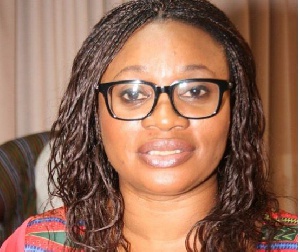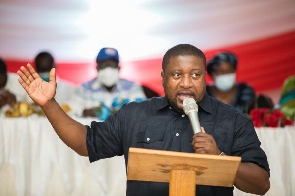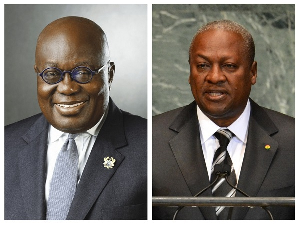The politics of filling election nomination forms, either for presidential, parliamentary or assembly candidate will never be the same in Ghana after October 10, 2016.
This day is a political tsunami in the annals of Ghanaian multi-party politics. The day that the Electoral Commission announced the disqualification of thirteen out of the seventeen presidential aspirants who filed their nominations on September 30, 2016 to contest the December 7, 2016 presidential election. (see, “EC disqualifies thirteen presidential aspirants”, Ghanaweb, October 10, 2016).
The article is the analysis of the decision and the ensuing legal battle between the EC and Nana Konadu Agyemang Rawlings.
A WhatsApp message drew my attention to the breaking news and after reading it on Ghanaweb (as no reasons were offered for the disqualifications), I jumped to conclusion that the political parties were disqualified under Article 55(7)(b) of the 1992 Constitution which states, “the party has branches in all the regions of Ghana and is, in addition, organised in not less than two thirds of the district of each region”. I was totally wrong with my assumption.
I read and watched the video clip of Mrs Charlotte Osei’s press conference on Ghanaweb and could not believe what I read and heard. That, these men and women who aspired to be president and vice-president of Ghana could not complete the nominations forms accurately. Wow!, what a national calamity? Yet, there is a lot noise when school children do bad at their final examinations. I am not suggesting that it’s ok for school children to perform poorly at exams but the performance of the leaders is an indication that the problem is not with children but perhaps, more serious than assumed.
What was also shocking was not only that these presidential aspirants could not complete the nomination forms accurately but some resorted to fraudulent means and criminal acts to short-circuit fulfilling the legal requirements. Is it surprising that there is corruption in high places in Ghana? Again, this is not an indication that Ghanaians should accept corruption but rather how do Ghanaians expect corruption to reduce when aspiring leaders are using corrupt means to get onto the ballot paper?
There have been lots of comments on the decision of the EC to disqualify the thirteen aspirants. In fact, some have insulted and attacked the EC Chairwoman, Mrs Charlotte Osei. Others have accused her of conspiratorial motives behind the decision, whilst the rest led by Nana Konadu Agyemang Rawlings and her Attorney (Ace Ankomah) have threatened to go to court if Nana Konadu Agyemang Rawlings is not reinstated.
It appears Ace Ankomah premised his legal challenge mainly but not exclusively on C I 94 Section 9(2)(a)(b) part of which reads “shall give the candidate an opportunity to make amendments or any alteration necessary, within the stipulated nomination period”. This argument falls flat because in the case of Nana Konadu and others the shortfalls were not mere mistakes or administrative errors but fraud and unlawful acts, therefore for the EC to have allowed them to have made the necessary amendments or alteration within the stipulated nomination period would be aiding and abetting fraud and unlawful acts.
The second legal argument of Ace Akomah is with the EC’s exclusion list of unqualified registered voters. That, since such persons have not been tried and convicted by a court of competent jurisdiction, the EC has no legal authority to declare them unqualified registered voters, put them on an exclusion list, let alone sanction them by rejecting their endorsement of presidential nomination form/s.
I find this argument ridiculous, especially, following months of nation-wide discourses on the credibility or otherwise of the Voters’ Register which culminated in the Abu Ramandan versus EC at the Supreme Court, which the SC ordered the EC to delete/clean the register.
In fact, Ace Ankomah was one of the most vocal Attorneys in Ghana who contributed to the discourse. When the EC failed to comply with the Orders of the SC because in the view of the EC, the SC did not order it to delete “the names of persons who have not established qualification to be registered”, he was interviewed on Newsfile and he confirmed that in his views the SC ordered the EC to delete the names of persons who have not established qualification to be registered and that included multiple registrants.
I remind Ace Ankomah and Nana Konadu that, the effect of the SC orders on the EC which the two of them were active participants in achieving, is the direct consequence of the disqualifications, so they have no legal cover to run under. For the avoidance of any doubt, I reproduce the SC orders below.
“The result is that we proceed to grant the following reliefs:
(1) That upon a true and proper interpretation of article 45(a) of the Constitution, the mandate of the Electoral Commission to compile the register of voters implies a duty to compile a reasonably accurate and credible register;
(2) A declaration that the current register of voters which contains the names of persons who have not established qualification to be registered is not reasonably accurate or credible and;
(3) A declaration that the current register of voters which contains the names of persons who are deceased is not reasonably accurate or credible”.
“In the exercise of the power conferred on us under article 2(2) of the Constitution, we make the following orders: (a)That the Electoral Commission takes steps immediately to delete or as is popularly known “clean" the current register of voters to comply with the provisions of the 1992 Constitution, and applicable laws of Ghana; and (b) That any person whose name is deleted from the register of voters by the Electoral Commission pursuant to order (a) above be given the opportunity to register under the law”.
Ace Akomah and her client should know that the above orders are now part and parcel of the Electoral Laws/Regulations of Ghana, though they may not be in the C I 94. Ace Ankomah in his legal arguments also created the wrong impression that the individual aspirants had no obligation to ensure that those who endorse their nominations forms were qualified to do so under the electoral laws of Ghana but rather the duty of EC to do so simply because they were unable to determine who is qualified or unqualified to do so, especially as the EC is the body that has such list. This is another porous and weak reasoning. The onus is on the aspirants to find out from those who they ask to endorse their forms, whether they are qualified to do so under law and if in doubt, verify from the EC.
The other question is, for how long has Ace Ankomah been representing Nana Konadu and her party as their Attorney? If he was their Attorney prior to September 30, 2015, then Ace Ankomah has more answers to give than ask questions. In that case he is part of this monumental failure so Nana Konadu and her party should take him to task for letting them down for his failure to ensure that the form was accurately completed prior to submission.
What are the potential political ramifications on the outcome 2016 presidential election if the disqualifications are affirmed by the judiciary? Previous election results in 2008 and 2012 indicate that the minor parties do not cause any problems for the electoral fortunes of the two major political parties since their share of the total votes cast is insignificant to change the final outcomes.
However, indications are that Paa Kwesi Nduom and his party (PPP) could do better in 2016 and potentially take the votes of independent and undecided voters from both NDC and NPP. Konadu and her party, NDP claim to be doing well in the Volta Region and could have caused damage to NDC’s stronghold in both presidential and parliamentary elections. These are not confirmed by any independent opinion polls.
However, Kondau and her party suspect that President Mahama and his ruling party, NDC have conspired with EC to disqualify her for the second consecutive time and would therefore join hands with NPP to defeat President Mahama and NDC. Nduom and his PPP may try to stay neutral but NPP may attempt to bait them with promises of ministerial position/s to form an alliance. As to whether they will buy the bait for reasons of ideological differences is another matter. However, it is possible that since PPP members were originally from the CPP, the CPP candidate may benefits from Nduom’s disqualification. The rest may gravitate towards NDC for some palm greasing.
Are there any lessons from the disqualifications? For those who are blaming the EC or relying on porous legal arguments to chastise the EC, they should take a hard look at themselves in the mirror and ponder over this. If these aspirants could not complete their nomination forms accurately, do they really deserve to be on the presidential ballot paper? Second, part of Ghana’s corruption, incompetence, lawlessness and development problems stem from the lack of enforcement and compliance with the laws, rules and regulations. We should therefore applaud the EC and not condemn it for enforcing the law.
When Obama visited Ghana in 2012, he said “Africa needs strong institutions and not strong men”. That may be true but that is not totally accurate. The audacity of the EC, led by a woman of substance to disqualify 76 percent of the presidential aspirants is courageous and commendable. Perhaps, in addition strong institutions, Ghana needs strong women with real balls and there is no doubt that Charlotte Osei has balls. I believe these fraudulent and unlawful acts have been happening and Dr Afari-Gyan glossed over them but Charlotte Osei will not.
The EC has done Ghanaian electorates a big favour by weeding out the undesirable from the ballot paper. With seventeen candidates and two bearing the same family names, is it not confusing for the electorates? This is more so considering the fact, majority of the electorate are unable to read and write.
Having said all the above, I am mindful that the disqualification battles are the purview of the judiciary but I am hopeful the courts will affirm the disqualifications to bring sanity into the electoral system. If the EC loses, it will have itself to blame for not relying on Article 55 (7)(b) of the 1992 Constitution to disqualify the presidential aspirants of the political parties.











